
Areas of Collecting
The Rosenbach’s 1860s townhouse and garden provide an intimate setting for the brothers’ collections of rare books, manuscripts, furniture, silver, paintings, prints, drawings, and sculpture. The house is located in the heart of the Rittenhouse-Fitler historic district in Center City Philadelphia.
In the years since its founding, the Rosenbach collections have continued to grow.
The decorative and fine arts collections are rich and varied, ranging from Egyptian sculpture and English furniture to American portraiture. Highlights of these collections include a fine mid-18th century Philadelphia tall chest, silver by Hester Bateman and Myer Myers, a portrait by painter Thomas Sully of 19th century civic leader Rebecca Gratz, and the largest collection of oil-on-metal portrait miniatures in the United States.
The Rosenbach preserves a nearly unparalleled rare book and manuscript collection, with particular strength in American and British literature and history. Exhibitions, programs, and research with this collection have focused on Colonial American history, African American history, children’s literature, book arts and technology, gay and lesbian literature, early Modernism, and much more.
Additionally, the Rosenbach has a long and important relationship with the modernist poet Marianne Moore (1887-1972). In the late 1960s, the museum purchased from Moore virtually all of her manuscripts and correspondence. When she bequeathed her personal belongings to the Rosenbach, the living room of her Greenwich Village apartment was recreated in the museum as a permanent installation. The Marianne Moore papers and living room have earned the Rosenbach designation as a National Literary Landmark by Friends of Libraries, USA.
The Rosenbach is an internationally known destination for lovers of literature, art, and history. Permanent installations, special exhibitions, outreach programs, and individualized research appointments work to bring the Rosenbach brothers’ vision to new and broader audiences every day.
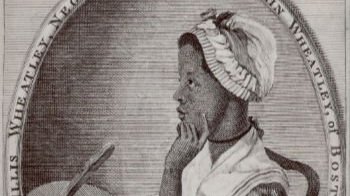
American Literature
American literature includes first editions of Anne Bradstreet, Phillis Wheatley, and Nathaniel Hawthorne, presentation copies of books by Herman Melville housed in a bookcase that once belonged to him; 19th-century dime novels; and first editions and letters of Emily Dickinson and Christopher Morley…

Americana
One of the greatest strengths of the Rosenbach’s library is Americana. The central topics of these collections are the European exploration and settlement of the New World and the political and military history of the United States from the first settlements through the Civil War…
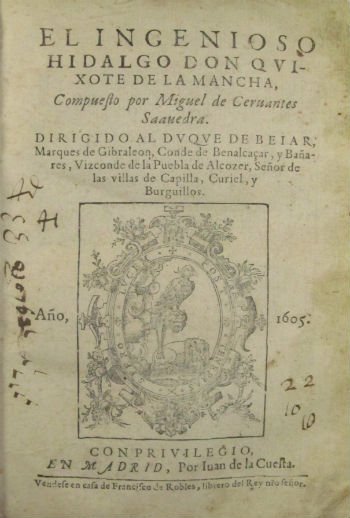
Continental Literature
Chief among these holdings is a group of Cervantes’s works, including the first edition of Don Quixote, Dr. Rosenbach’s favorite book, and documents in Cervantes’s hand…
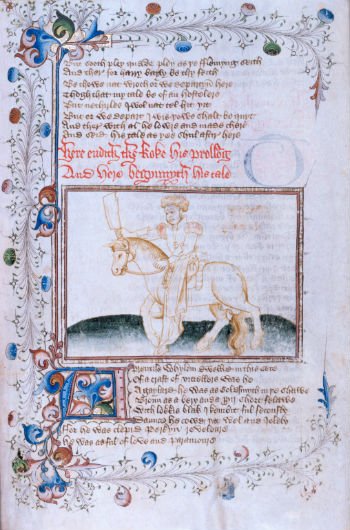
English Literature
The largest portion of the literary collections is English-language literature of the British Isles, including Scotland, Ireland, and Wales. Printed works and manuscripts range from the 15th through the mid-20th century and include poetry, drama, novels, periodical publications, and some nonfiction; as well as letters and other documents by and about authors.

Fine Arts
The Rosenbach’s collection of paintings includes important American portraits by Gilbert Stuart, Thomas Sully, Bass Otis, Matthew Jouett, and John Wesley Jarvis; and European genre paintings including those attributed to Angelica Kauffman and the American expatriate Benjamin West. Many paintings are installed in the historic house where Rosenbach family portraits and travel souvenirs by artists of the school of Caneletto lend a personal quality to the collection…

Furniture, Lighting, & Textiles
The furniture in the collections range from the 16th to the 20th century and include examples of British, American, and Continental origin. Among the highlights are an eighteenth-century Philadelphia high chest, an elaborate French orbital clock by Jean Baptiste Baillon, and a massive sixteenth-century refectory table. Although many pieces are associated with known makers, this is an area in the collections that requires further research…

James Joyce's Ulysses
James Joyce (1882-1941) has been called the greatest 20th-century novelist writing in English. Ulysses is his masterpiece. The manuscript of Ulysses is among the premier treasures of the Rosenbach. Dr. Rosenbach owned a first edition of the novel – the banned book had been smuggled into the country for him in 1922.

Jewelry & Vertu
Objects in this category include walking sticks, snuff boxes, decorative stone bottles and cases, eyeglass and card cases, bookmarks, thimbles and sewing kits, small plaques in various media, as well as jewelry dating from antiquity to the 20th century…

Judaica & Rosenbachiana
Dr. A.S.W. Rosenbach formed a highly important collection of early American Judaica. He gave the bulk of this collection to the American Jewish Historical Society (AJHS) in 1931. Nonetheless, significant Judaica remain at the Rosenbach, including several Hebrew incunabula, the Amsterdam Haggadah of 1695 (the first with a map of the Exodus), and the first Hebrew grammar printed in the United States (1731)…
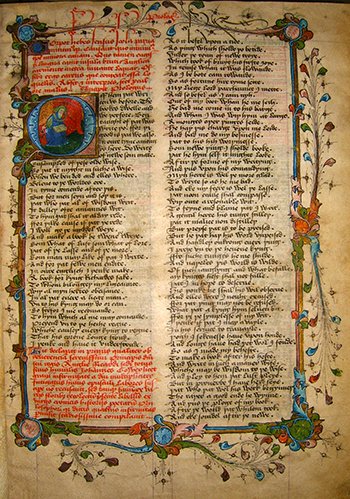
Maps, Codex Manuscripts, Incunabula, & Book Arts
Objects in these categories are notable for their physical features in addition to their intellectual content. Maps in the collection indicate not only what was known about the world from the 16th through the 19th centuries, but what different users needed to know, presented in formats suited to their varying circumstances. About two dozen codex manuscripts, many of them illuminated, represent the arts of the book in Europe before printing, and nearly 100 incunabula are among the earliest examples of European movable-type printing. Other books, such as a complete set of Kelmscott Press titles, were collected as beautiful specimens of the book arts. Beyond their aesthetic qualities, bindings, illuminations, illustrations, and typography can also reveal the ways in which books were made and used, providing insight into topics like trade practices and education in the societies from which they came.

Marianne Moore
The Rosenbach’s literary collections include virtually all of the manuscripts and papers of Modernist poet Marianne Moore (1887-1972), as well as her personal library, thousands of photographs, and the contents of her Greenwich village living room, thus making the Rosenbach the undisputed center for the study of this important American writer. The Moore Collection is a unique literary repository, preserving intact a comprehensive record of a writer’s intellectual development. The Rosenbach has become a pilgrimage site for students and lovers of twentieth-century American art and literature, and the Moore papers are the heart of this collection.
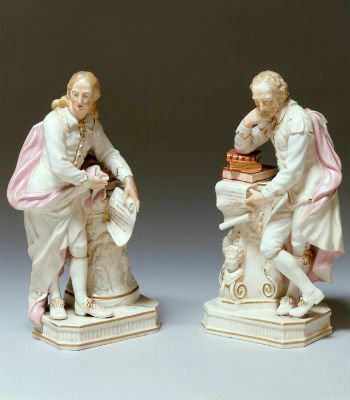
Metal, Ceramic, & Glass
These media are most often represented by domestic objects, many of them Rosenbach family belongings, but some collected for use, resale, or display by the brothers. Ceramics range from the 16th to the 20th century and were produced in England, France, China, and Italy. Famous makers include Derby, Wedgwood, and Sèvres. Two centuries of crystal manufacture include chandeliers and tableware from Britain and the Continent. Work in metal consists of Samuel Yellin ironwork, and silver flatware and hollowware dating from the 17th to the 20th century by Myer Myers, Paul Storr, Hester Bateman, Tiffany Co., as well as a range of 19th-century Philadelphia manufacturers and earlier silversmiths from Russia, Ireland, Holland, England, Italy, and France.
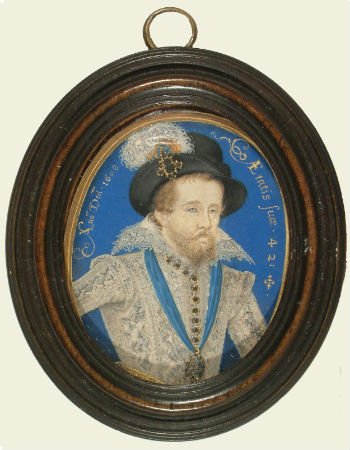
Portrait Miniatures
Philip Rosenbach purchased a collection of 450 portrait miniatures from English painter Talbot Hughes in 1928. The largest collection of oil on copper miniatures in the United States, it includes portraits painted by English, Dutch, Spanish, Italian, and French artists. In addition to the Hughes collection, the Rosenbach maintains a fine selection of American, English, and Continental miniatures in other media: watercolor on vellum, watercolor on ivory, enamel, and wax, as well as one miniaturist’s paintbox and another’s diary and account book. The portraits date from the 16th to the 19th century. Although many retain their original frames, a large number have been reframed, probably by an earlier collector, to standardize their appearance. Philip Rosenbach displayed the miniatures grouped in a series of tortoise-shell frames.
We are transitioning our extensive archive of material from our previous website and will regularly update these pages. If you are looking for something specific that hasn't yet been updated, please contact us at info@rosenbach.org.
